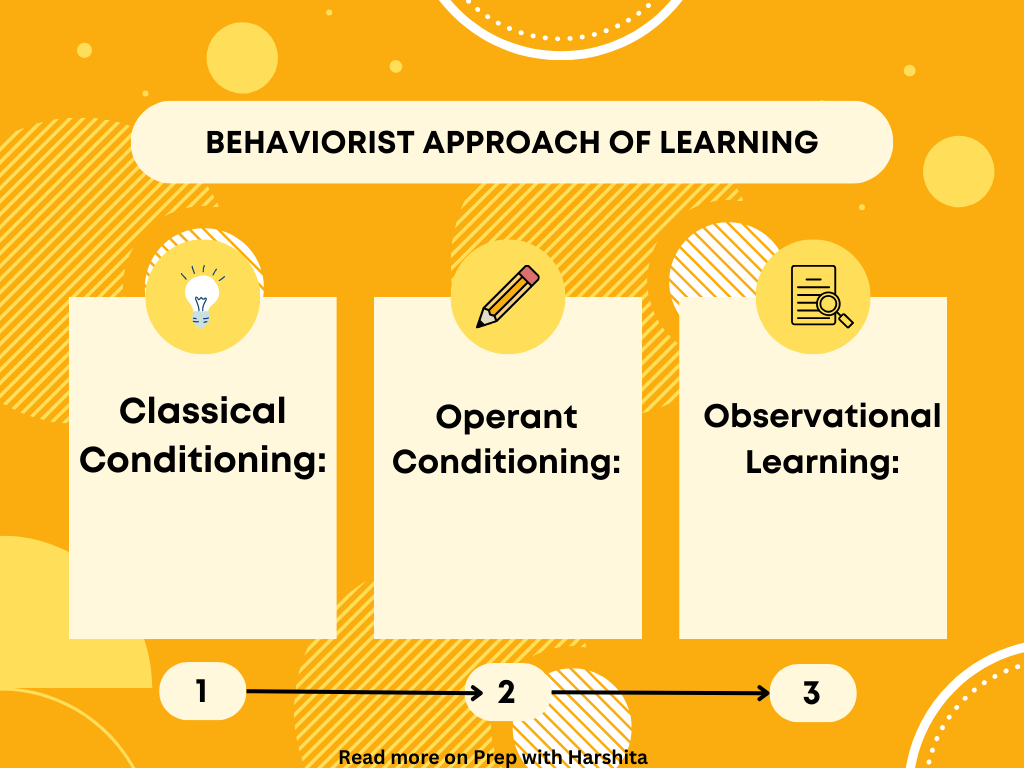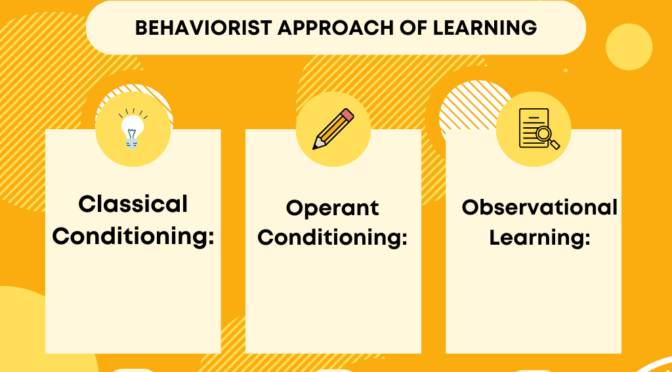Operant Conditioning:
- Introduced by B.F. Skinner, operant conditioning focuses on how behaviors are influenced by their consequences, such as reinforcement and punishment.
- In operant conditioning, behaviors are strengthened or weakened based on their consequences. Positive reinforcement involves presenting a pleasant stimulus to increase the likelihood of a behavior, while negative reinforcement involves removing an unpleasant stimulus to achieve the same effect.
- Punishment involves presenting an unpleasant stimulus or removing a pleasant one to decrease the likelihood of a behavior.
- Operant conditioning principles are widely applied in education, including classroom management, behavior modification programs, and teaching strategies aimed at shaping desired behaviors.
Observational Learning:
- Also known as social learning theory, observational learning was developed by Albert Bandura. It emphasizes the role of modeling, imitation, and vicarious reinforcement in learning.
- Observational learning occurs when individuals observe the behavior of others and its consequences. Then imitate or refrain from imitating that behavior based on the observed outcomes.
- Key components of observational learning include attention, retention, reproduction, and motivation.
- Observational learning plays a significant role in educational settings, as learners often acquire new behaviors, skills, and attitudes by observing and imitating teachers, peers, or other role models.
Also Visit: Prep with Harshita



GLOBAL BUSINESS ELITE YOUR WHOLESALE SUPPLIER OF AGRICULTURAL AND INDUSTRIAL COMMODITIES
We are a global company providing food, ingredients, agricultural solutions and industrial products that are vital for living. We connect farmers with markets so they can prosper. We connect customers with ingredients so they can make meals people love. And we connect families with daily essentials from eggs to edible oils, salt to skincare, feed to alternative fuel. https://globalbusinessltd.co.uk/
Global business elite
copper cathode
aluminium wire scrap
scrap processor
scrap cpus
waste paper scrap
fridge compressor scrap
cable scrap
scrap copper wire
waste paper for sale
ceramic cpu scrap
icumsa 100
cpu scrap
wholesale sugar suppliers uk
scrap processor
scrap central processing units
occ paper scrap
occ waste paper scrap
nut prosper globe
ocopper cathode specifications
sachet water filling and sealing machine
insulated copper wire scrap
waste paper supplier
recycled copper wire
copper scrap wire
occ waste paper suppliers in uk
processor gold recovery
waste paper supplier
ccopper wire scrap millberry
Hello. impressive job. I did not anticipate this. This is a excellent story. Thanks!
Thanks for the strategies you have shared here. On top of that, I believe usually there are some factors that keep your automobile insurance premium straight down. One is, to bear in mind buying automobiles that are in the good listing of car insurance providers. Cars which might be expensive are more at risk of being snatched. Aside from that insurance is also based on the value of your car, so the higher priced it is, then higher the particular premium you spend.
I think other site proprietors should take this website as an model, very clean and great user genial style and design, let alone the content. You’re an expert in this topic!
Good info. Lucky me I reach on your website by accident, I bookmarked it.
Good – I should certainly pronounce, impressed with your website. I had no trouble navigating through all the tabs as well as related info ended up being truly simple to do to access. I recently found what I hoped for before you know it in the least. Reasonably unusual. Is likely to appreciate it for those who add forums or something, web site theme . a tones way for your customer to communicate. Excellent task..
I don’t think the title of your article matches the content lol. Just kidding, mainly because I had some doubts after reading the article.
F*ckin’ remarkable things here. I am very satisfied to see your post. Thank you so much and i am having a look forward to contact you. Will you please drop me a e-mail?
Hello, i believe that i noticed you visited my blog thus i came to “go back the choose”.I’m attempting to to find things to enhance my site!I guess its adequate to make use of a few of your concepts!!